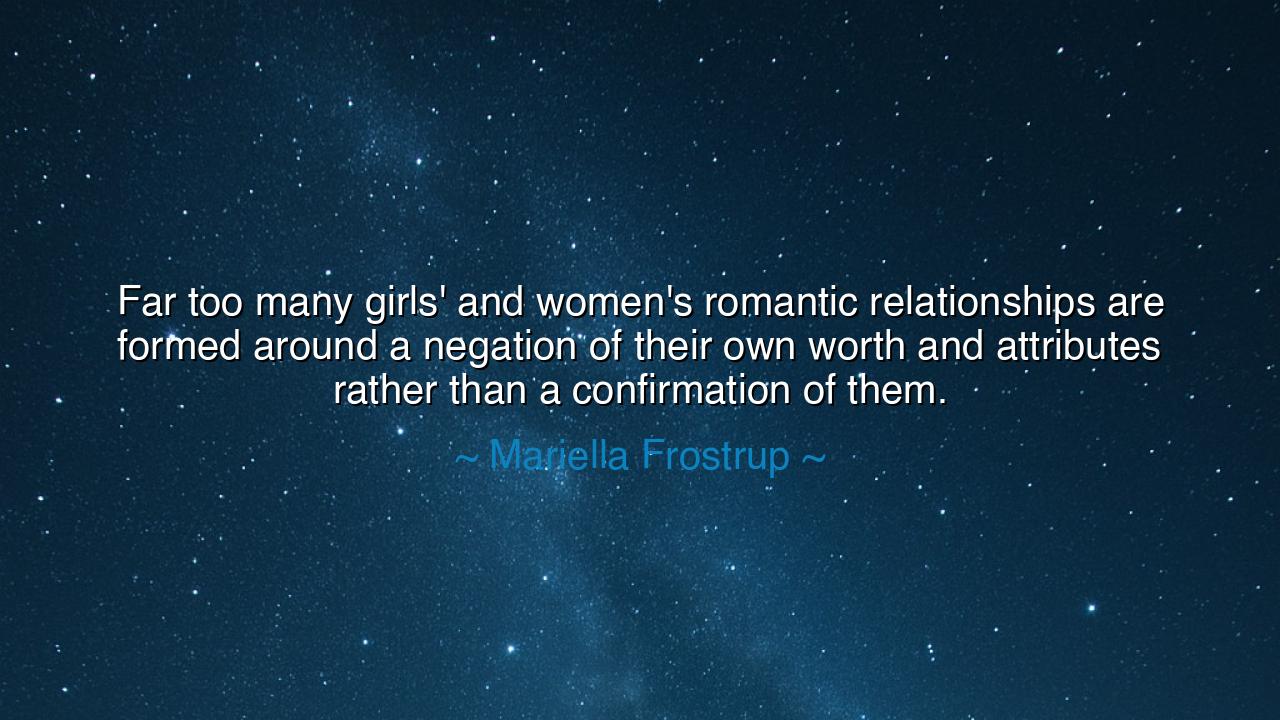
Far too many girls' and women's romantic relationships are formed
Far too many girls' and women's romantic relationships are formed around a negation of their own worth and attributes rather than a confirmation of them.






"Far too many girls' and women's romantic relationships are formed around a negation of their own worth and attributes rather than a confirmation of them." These words by Mariella Frostrup are a lamentation, a call to awaken the soul to the deep truth that resonates through the lives of many. In them lies a powerful truth, one that has echoed throughout time and across cultures—the neglect of self-worth in the pursuit of love, especially among women, is not a new plight but one deeply rooted in the fabric of our history. For centuries, the notion that a woman’s worth is found in the eyes of another, in her relationship to someone outside herself, has shaped her identity. Romantic love, so often revered as the pinnacle of fulfillment, has too often been treated as a means of validating what she could not find within herself.
From the dawn of civilization, women were often taught that their value rested not in their intellect or their strength, but in their beauty, their obedience, and their relationship to others. The great epics of antiquity, like the tales of Helen of Troy, show us how a woman’s worth could be defined by her connection to men—whether it was love or war that sparked her story. Helen’s beauty became the symbol of her worth, the very reason for the Trojan War and the destruction of kingdoms. Yet, in her tale, there is a shadow—a reflection of how society often devalues women beyond their inner strength, seeing them instead as objects to be possessed, loved, or desired. The lesson here is clear: the value of a woman should never be contingent upon the affirmation of another.
In contrast, consider the wisdom of the ancient philosophers who spoke of the importance of self-knowledge and self-worth. Socrates, the father of Western philosophy, urged us to "know thyself." This deep call for self-awareness was not merely a passing thought—it was the foundation of a life well-lived. Yet, for too long, society has twisted this idea for women, suggesting that their true worth lies outside themselves. The greatest tragedy of love, as Frostrup points out, is that so many women are conditioned to base their sense of self on how they are seen through the lens of romantic relationships, rather than building it on the unshakable foundation of their own intrinsic value.
There are countless stories, from the mythical to the real, that show us the dangers of self-neglect in the pursuit of love. One such example can be found in the life of Antigone, the tragic heroine of Sophocles’ play. She defied the king, her uncle, to bury her brother, and in doing so, she chose her duty and her family over the expectations of others. But Antigone’s tragic flaw lies in her neglect of her own desires and self-worth in the pursuit of what she thought was her obligation to others. Her love for her family was noble, but it came at the cost of her own life. This tale speaks to the danger of living for others—of losing oneself in the process of trying to fulfill roles that are imposed upon us, rather than embracing the fullness of our own being.
The ancient wisdom tells us that love is a reflection of one’s own heart. True, powerful love cannot exist without self-acceptance. A relationship formed around the negation of one's worth is like building a house on a foundation of sand—soon, it will crumble. Self-love and self-respect are the pillars upon which a healthy relationship stands. If one cannot stand firm in their own worth, how can they expect another to see it? Frostrup's words remind us that the woman who enters a relationship seeking validation from another is setting herself on a path toward disillusionment. True love, the kind that sustains, is the love that confirms one’s inherent worth, not one that diminishes or denies it.
Think of the great Cleopatra, whose power and beauty were renowned across the ancient world. Yet, in her relationships with Julius Caesar and Mark Antony, there was more than just a pursuit of romantic love—there was an assertion of her own power, intellect, and sovereignty. Cleopatra did not let her worth be determined by the men she loved; she shaped her own destiny. She was a queen not just because of her relationships, but because she understood the strength of her own character. She is an enduring symbol of a woman who, though engaged in romantic relationships, never let them overshadow her own worth.
The lesson for us, the future generations, is one of empowerment. Do not enter relationships seeking to define yourself through the lens of another. Know yourself, love yourself, and let that self-love be the foundation upon which all other loves are built. Seek relationships that affirm your worth, that celebrate your attributes, your strengths, your vulnerability. Do not settle for love that diminishes you. Just as Socrates and the great thinkers of the past taught, know thyself—and in that knowledge, you will find the greatest love of all: the love that comes from within. Only then will you attract relationships that nurture and elevate, not those that rely on the negation of your being. Let your self-worth be the beacon that guides you, not the shadows cast by others.






AAdministratorAdministrator
Welcome, honored guests. Please leave a comment, we will respond soon